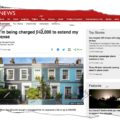The All-Party Parliamentary Group recognises the efforts of the Law Commission and welcomes efforts to make leasehold enfranchisement – extending leases and leaseholders’ buying the freehold – easier, simpler and more cost-effective.
While the proposals may be seen as a step in the right direction it still leaves in place many aspects of what is a fundamentally unjust system
The Law Commission proposes to government a number of options for reform, and the APPG naturally favours the options that assist leaseholders, who do not have the resources of commercial residential freeholders to dispute enfranchisement valuations through the courts (occasionally, the highest courts).
As a result, we welcome the Law Commission proposal that leaseholders be allowed to extend their leases on the basis of the valuation of the reversion to the freeholder (the years on the existing lease) and the value of the lease extension.
The APPG welcomes the suggested removal of additional “marriage value”: the supposed extra value obtained, by complex calculations, when the freehold and leasehold are combined in single ownership.
The APPG also applauds the Law Commission for suggesting that the level of ground rent on which the value of “the term” is calculated be capped at 0.1% of the freehold value of the property.
Prescribing the rates that are used to calculate the value of the term, reversion or marriage value – if this is persisted with – would also be beneficial for leaseholders and avoid the expense of legal process.
The APPG’s paramount concern is fairness in what is at present an unbalanced process, where well resourced freehold owners game the system to their advantage.
This emphasises that leasehold owners are merely tenants, rather than real home owners.
At a time when thousands of leaseholders are caught up in the cladding scandal, and face zero valuations of their homes, this is not positive.





 Marriage value a bogus profit in the £2.5bn enfranchisement racket, LKP trustee Dean Buckner tells BBC
Marriage value a bogus profit in the £2.5bn enfranchisement racket, LKP trustee Dean Buckner tells BBC






















Having read the report in full the interpretation I draw from this is as follows:-
The idea of a simple formula of 10yp or 1% of the value of the flat are cleared off the desk in quite clear terms
The rest of the report seeks to open up the debate by suggesting there are THREE general way forward (including the possibly of removal of marriage value ) to a hybrid version where Hope value replaces marriage value and finally the current formula – to all three it proposes some additional bolt on ideas
To suggest the law commission feel that marriage value is likely to go is wrong and raises hope to lessees with no clear foundations to support this aside from the fact it is one of three possible models being Put up for discussion
If property deals, particularly on short leases , have been struck when an established formula for the cost of a lease extension was in place at the time of the deal then it is reasonable to suggest that the price the lessee pays for the flat reflects that cost. Therefore if the formula changes in the lessees favour then it hands a windfall to the lessee at the expense of the freeholder – accordingly it is not surprising that this will be challenged
I would add that a formula with prescribed rates – certainly for modest priced properties appears to be very much the way forward so as to relieve the lessee of legal and valuation fees which even for a modest flat with a 60-80 year lease can easily come to some £4K to £5k ( as they pay the landlords costs) even if it is not fiercely contested and could well represent a sizeable proportion of the total cost
Don’t misrepresent us, please.
What benefit, if any, is obtained for leaseholders from the Law Commission report will have to be fought for by leaseholders in the face of a deluge of lobbying by lawyers and others representing the commercial interests of a £2.5 billion a year business.
Only read summary so far. Isn’t it grand how a feudal system of contract is so enshrined that making it fairer becomes a possible breach of ‘human rights’ because it is unfair?
Online binding calculator sounds very positive. Hands up those who think it will be introduced.
Prescribing the capitalisation and reversion rates is excellent as these can be fiendishly unfair. Hands up those who think prescribing will be introduced?
As for relativity and uplift, seems to me to be codology in the real market. I suspect nothing will change here.
Meanwhile,
Is ground rent currently ‘capped’ by lenders as 0.1% of the freehold value? I thought it was 0.1% value of the leasehold value? I don’t understand anything anymore. Where’s Stephen please?
I’ve never believed meaningful reform will happen. Reading this I still don’t. Could just as easily end up costing more. Marriage value originally was a last minute amendment, no? I’ve seen extended leases sell for less than identical flats with un-extended ones. The marriage value was more a dowry for the landlord who never had to reach the altar.
I’m tired of the vested interests talking about me getting a “windfall” when what I am getting is my property back – the one I paid for and the Freeholder did not.The parastic system in place allows a 3rd party to buy for next to nothing the ownership of a property (actually thousands) at a next to nothing price and then demand massive payments later on! That freehold should be offered at the same price to the person who borrowed a fortune to “buy” a home.
When you buy a new build Leasehold house the true ownership is often sold to a speculator for £2000 or probably much less, a price and an opportunity never offered to you and not available.
That’s right, a 3rd party actually owns the home you think you just bought. The Title is sold behind your back. It looks like a fraud. It is a fraud but allowed by law. The law says it is ok to cheat Leasehold house buyers. You then spend the rest of your life paying for someone else’s house and even pay rent (groundrent).
In order for a contract to be fair, both parties must know what deal they are entering into. There must not be unfair terms or entrapment and material facts must be made known.
The Leasehold system, from purchase point to signing the lease, fails to meet these requirements and in fact there is systemic abuse of the law and systemic lack of good advice from professionals.
Most people think they purchased a house or flat not that they entered into an agreement where a 3rd party has a big financial interest in the property they are paying for.
Leaseholders are NOT made aware of crucial facts and do not know they are Tenants rather than home owners, particularly in houses. Even in flats, the true ownership and true Landlord-Tenant relationship is hidden or not made clear.
The key facts that have massive financial impacts are not stated in Plain English at any point.
These options proposed by the Law Commission do not even fulfil their remit to make Enfranchisement “cheaper” – not just a bit – for ALL leaseholders, not just those under 80 years.
Instead of root and branch reform – as identified in their own report and supported by a mountain of evidence which they have ignored – we have actually ended up with TWO options. The third option is an unbelievably arrogant and dismissive option of keeping things as they are!! – and so not even doing what they were tasked to do – develop reforms to make Enfranchisement ” cheaper, quicker and easier”. This is tinkering, not reforming and based on the assumption that Leasehold is fine in complete contradiction to all the evidence and their own reports. Option 3 just allows a Govt the opportunity to do nothing much – everything the same as before with tweaks.
They say the “Freeholder” deserves compensation otherwise his Human Rights will be denied. They don’t say his Human Rights will be denied if he still makes a whacking great profit for doing nothing and contributing nothing. They will only be denied if the “compensation” is not big enough. So they dismiss out of hand the level favoured by the 5m trapped leaseholders: either a multiple of ground rent or a percentage of 1 or 2 per cent of the market value.
Cheating people and using them as an income stream is not a human right. Freeholders expect to benefit from the value in the home despite not paying anything for it or after having paid a fraction of the cost that the householder has paid.
Not enough weight has been given to Public Interest and the Common Good or the fact that no other country has this system. The lives and incomes of 6m people are the Common Good and a Public Interest.